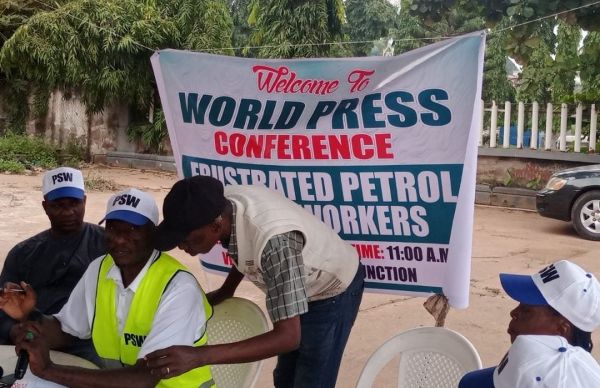Petrol Station Workers Cry Out Over Neglect, Demand Fair Wages and Protection

As tensions rise in Nigeria’s petroleum sector amid ongoing refinery and union disputes, a neglected workforce — petrol station workers — has stepped forward to demand fair wages, safety protection, and legal recognition.
Operating under the banner of the Concerned Petrol Station Workers (CPSWs), the group accused employers and regulators of turning a blind eye to the exploitation and abuse suffered by frontline fuel attendants who keep Nigeria’s economy moving daily.
“We Are Dying in Silence,” Say Workers
In a statement released in Kaduna by Ibrahim Zango, spokesperson of the CPSWs, the workers decried poor pay, unsafe conditions, and systemic neglect despite their vital role in fuel distribution.
“We are the ones who stand under the scorching sun and in the rain to serve millions every day, yet we are treated as if our lives don’t matter,” Zango said.
“We fear losing our jobs if we speak up, even though we are the engine room of the Nigerian petroleum industry.”
According to the group, many fuel attendants and support staff earn between ₦20,000 and ₦30,000 per month, an amount they described as “inhumane and far below the cost of survival in today’s Nigeria.”
Exploitation and Hazardous Working Conditions
Beyond poor pay, the workers cited routine exploitation and exposure to danger as major concerns.
They alleged that attendants are frequently forced to cover fuel shortages or pump errors from their wages, even when such discrepancies arise from faulty equipment or management lapses.
“We are made to pay for losses we didn’t cause, exposed daily to toxic fumes, robbery attacks, and even fire outbreaks — all without insurance, protective gear, or medical support,” Zango lamented.
The group said that when accidents or robberies occur, station owners often “disappear,” leaving injured workers to fend for themselves without compensation or job security.
“We are the unsung heroes of Nigeria’s oil economy, yet our welfare is ignored,” the statement read.
Intimidation and Suppression of Workers’ Rights
The CPSWs also alleged that attempts to unionize or demand better conditions are met with intimidation and harassment from petrol station owners who seek to silence activism.
“Even the law doesn’t protect us. We can’t form unions, and NUPENG has not organized us effectively. We are just on our own,” Zango said.
The group urged the Federal Government, the Ministry of Labour and Employment, and the Nigeria Labour Congress (NLC) to ensure that petrol station workers are included in ongoing petroleum sector reforms and labour negotiations.
Workers Demand Dignity, Not Charity
The CPSWs listed their key demands, including:
- Fair and livable wages reflecting the cost of living
- Protective equipment and insurance for workplace safety
- Regulated shifts and rest breaks to prevent burnout
- Right to unionize under NUPENG or a dedicated workers’ body
- Inclusion in national labour and petroleum reform policies
“Petrol station workers are not invisible or expendable. We are Nigerians who keep the economy running — often at the expense of our health and dignity,” Zango declared.
“Our voices must be heard, and our rights protected.”
BRANDECONOMY INSIGHT: The Forgotten Frontline of Nigeria’s Fuel Economy
While the spotlight often shines on refineries, unions, and government agencies, fuel attendants remain the unacknowledged human infrastructure sustaining Nigeria’s energy distribution chain.
From dawn till dusk, they power an economy dependent on petrol, often without job contracts, social protection, or recognition under national labour laws.
Their growing outcry adds a critical human dimension to Nigeria’s petroleum crisis — underscoring the urgent need for inclusive reforms that prioritize both industry efficiency and worker welfare.
BRANDECONOMY TAKEAWAY
Petrol station workers are the invisible backbone of Nigeria’s energy sector — serving millions daily with little recognition or protection.
Their call for fair pay, safety, and dignity reflects a broader demand for social justice and inclusive growth in an industry long defined by inequality and neglect.
As Nigeria reforms its petroleum ecosystem, labour dignity must stand beside energy security as a national priority.











